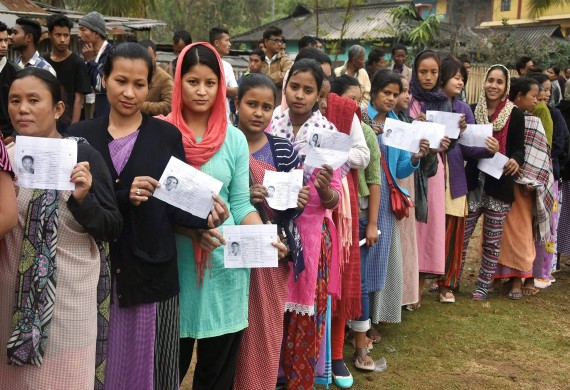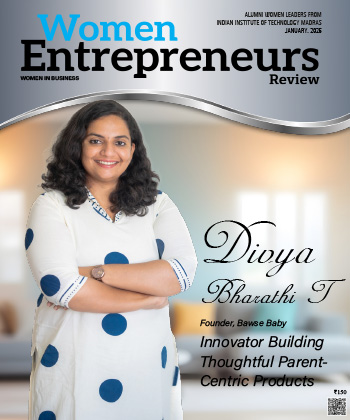
Women's Participation outnumbers men's In Polls, Chief Election Commissioner
By: WE Staff | Saturday, 27 November 2021
Since the first Lok Sabha elections, India's democracy has come a long way, and today, seven decades and 17 general elections later, women's participation in exercising their right to vote has surpassed that of men, according to Chief Election Commissioner Sushil Chandra.
He also stated that democracy and democratic institutions thrive when all people groups are represented equally.
Mr Chandra spoke at an international webinar on 'Enhancing Electoral Involvement of Women, Persons with Disabilities, and Senior Citizens' about how the Election Commission worked hard to increase the participation of women, people with disabilities, senior citizens, and transgender people.
He noticed that women's voting rights were extended piecemeal in most countries and territories.
He noted that it took the United States 144 years to grant women equal voting rights.
Women in India were granted the right to vote in the year after the country gained independence.
This does not change the fact that many Indian women fought for equal voting rights. According to him, the Indian suffragette movement gained traction as more and more women joined the freedom war.
The main logistical problem arose during the production of electoral records, when a substantial number of women refused to reveal their actual names, preferring to be listed as A's wife or B's mother, he said.
The Election Commission had to publish guidelines stating that a woman's name is an important aspect of her identity and that she must register to vote in her own name. Public appeals were made, and a one-month extension was granted to allow women to register to vote.
Wherever it was thought that women voters might have difficulty appearing at polling booths, such as in the case of 'purdahnashin,' or women who wear veils, special women booths were built up, with 27,527 polling officers who were all women.
According to the Chief Election Commissioner, about 40,000 people registered as third gender voters in the 2019 elections.
Most Viewed
- 1 Women's Health Startup HerMD Closing Doors Amid Industry Challenges
- 2 5 Famous Women in Indian Armed Forces
- 3 Saudi Women No longer Require Male Permission for Clothing Choices, says Prince MbS
- 4 Kolkata Medtech Startup Innovodigm Raises Rs 5.5 Crore Seed Funding Led by IAN Group
- 5 Yamunanagar's Kashish Kalra Honoured after Securing 111th Rank in UPSC Civil Services Exam
- 6 Madurai Appoints Its First Woman Corporation Head
- 7 IAS Vijayalakshmi Bidari Appointed as the new Nagpur Divisional Commissioner
- 8 American Entrepreneur Lucy Guo Overtakes T Swift to become Youngest Female Billionaire
- 9 ICC Women's World Cup 2025 Trophy Showcased at Indore's Holkar Stadium
- 10 Aparna Saxena's Beauty Venture AntiNorm Launches in India
- 11 Vidya Nataraj Co-Founded BlueStone Jewellery & Lifestyle files IPO
- 12 5 Women Freedom Fighters of India
- 13 Dr. G Krishnapriya appointed as CEO for Trichy
- 14 M3M & Sirona Partner to Introduce Menstrual Hygiene Vending Machines in 15 Locations
- 15 Punjab Govt launches SHE Cohort 3.0 Supporting Tech-led Women Startups
- 16 Indian origin Lawyer, Sweena Pannu appointed as the US New Superior Court Judge
- 17 The Aurora Tech Award recognizes 4 Indian Women-led Startups
- 18 Kerala's Republic Day parade featured an all-female tableau
- 19 Manisha Kabbur Becomes Karnataka's First Woman International Karate Coach
- 20 Director K. S. Ravikumar's Daughter Maalica Ravikumar Launches Life Coaching Company 'Evergrowth Academy' for Women
- 21 Leezu's Raises Pre-Seed Funding to Accelerate Growth in Sexual Wellness Industry
- 22 Sattu: Super-easy summer drink for PCOS gut healing
- 23 Swathi Nelabhatla creates Sitha App, India's First Women-Exclusive Gig Platform
- 24 7 Timeless Female Kathak Dancers & their Iconic Legacies
- 25 Meet 7 Iconic Women Architects of Modern India & their Most Impactful Work
- 26 This Woman-led Insuretech Startup is Helping Bridge the Education Financing Gap in India
- 27 Women Leaders Share Lessons Learnt from India Women's WC Win
- 28 5 Enterprising Women Founders Powering Singapore's Tech & Innovation Landscape
- 29 4 Women. 4 Stories. One Vision for Smarter, Stronger Healthcare
- 30 Global Gender Gap Narrows to 68.8%, But Full Equality 123 Years Away: WEF Report 2025
- 31 Changemakers: 7 Women Entrepreneurs Taking the Make in India Movement Forward
- 32 Meet Lucy Guo, The Youngest Self-Made Female Billionaire Disrupting Tech
- 33 How Women are Driving India's Festive Online Shopping Surge






